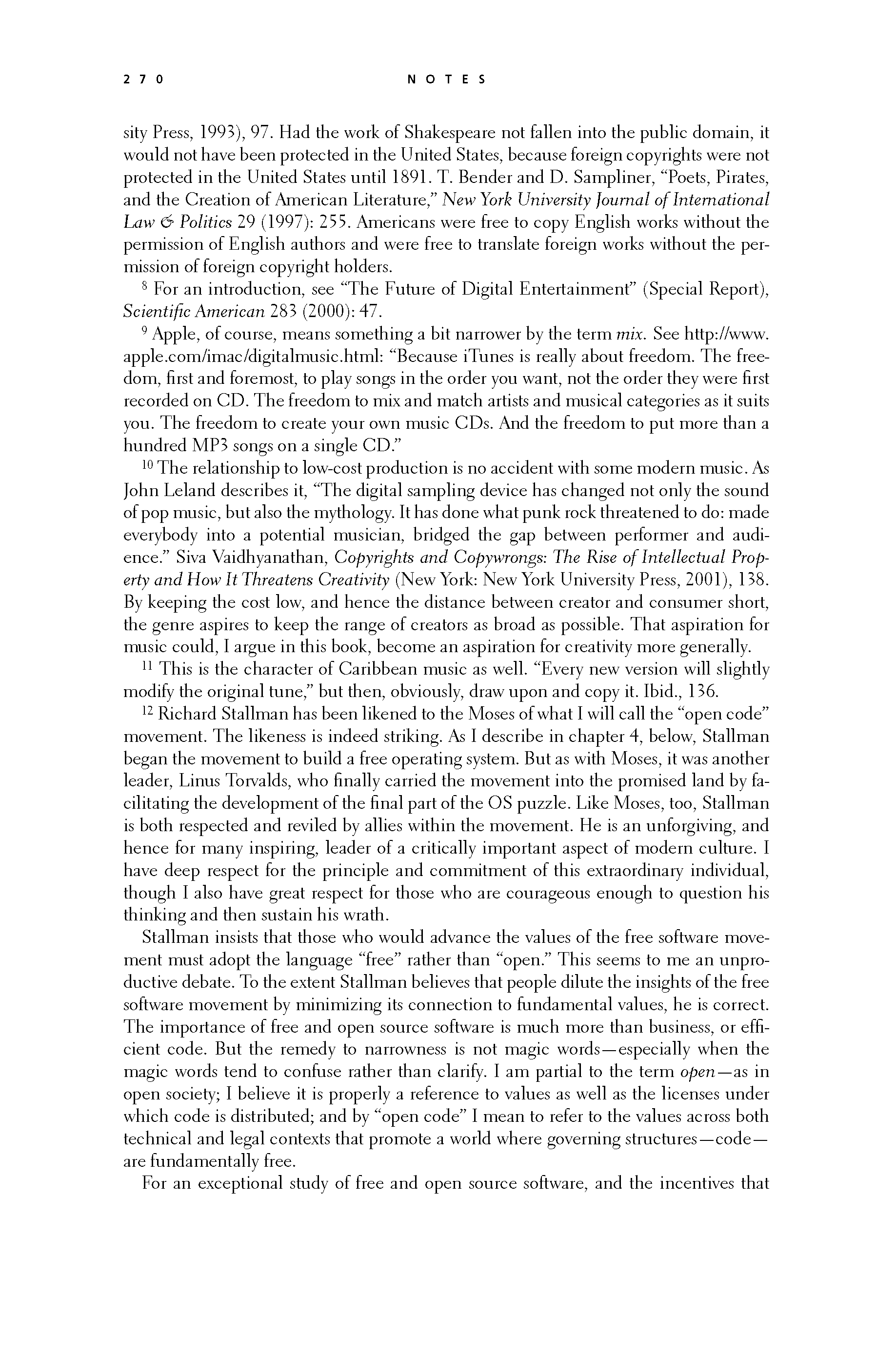 p269 _
-chap- _
toc-1 _
p270w _
toc-2 _
+chap+ _
p271
p269 _
-chap- _
toc-1 _
p270w _
toc-2 _
+chap+ _
p271
sity Press, 1993), 97. Had the work of Shakespeare not fallen into the public domain, it
would not have been protected in the United States, because foreign copyrights were not
protected in the United States until 1891. T. Bender and D. Sampliner, "Poets, Pirates,
and the Creation of American Literature," _New_York_University_Journal_of_International_
_Law_&_Politics_ 29 (1997): 255. Americans were free to copy English works without the
permission of English authors and were free to translate foreign works without the per-
mission of foreign copyright holders.
[1-8] For an introduction, see "The Future of Digital Entertainment" (Special Report),
_Scientific_American_ 283 (2000): 47.
[1-9] Apple, of course, means something a bit narrower by the term _mix._ See http://www.
apple.com/imac/digitalmusic.html: "Because iTunes is really about freedom. The free-
dom, first and foremost, to play songs in the order you want, not the order they were first
recorded on CD. The freedom to mix and match artists and musical categories as it suits
you. The freedom to create your own music CDs. And the freedom to put more than a
hundred MP3 songs on a single CD."
[1-10] The relationship to low-cost production is no accident with some modern music. As
John Leland describes it, "The digital sampling device has changed not only the sound
of pop music, but also the mythology. It has done what punk rock threatened to do: made
everybody into a potential musician, bridged the gap between performer and audi-
ence." Siva Vaidhyanathan, _Copyrights_and_Copywrongs:_The_Rise_of_Intellectual_Prop-_
_erty_and_How_It_Threatens_Creativity_ (New York: New York University Press, 2001), 138.
By keeping the cost low, and hence the distance between creator and consumer short,
the genre aspires to keep the range of creators as broad as possible. That aspiration for
music could, I argue in this book, become an aspiration for creativity more generally.
[1-11] This is the character of Caribbean music as well. "Every new version will slightly
modify the original tune," but then, obviously, draw upon and copy it. Ibid., 136.
[1-12] Richard Stallman has been likened to the Moses of what I will call the "open code"
movement. The likeness is indeed striking. As I describe in Chapter 4, below, Stallman
began the movement to build a free operating system. But as with Moses, it was another
leader, Linus Torvalds, who finally carried the movement into the promised land by fa-
cilitating the development of the final part of the OS puzzle. Like Moses, too, Stallman
is both respected and reviled by allies within the movement. He is an unforgiving, and
hence for many inspiring, leader of a critically important aspect of modern culture. I
have deep respect for the principle and commitment of this extraordinary individual,
though I also have great respect for those who are courageous enough to question his
thinking and then sustain his wrath.
Stallman insists that those who would advance the values of the free software move-
ment must adopt the language "free" rather than "open." This seems to me an unpro-
ductive debate. To the extent Stallman believes that people dilute the insights of the free
software movement by minimizing its connection to fundamental values, he is correct.
The importance of free and open source software is much more than business, or effi-
cient code. But the remedy to narrowness is not magic words -- especially when the
magic words tend to confuse rather than clarify. I am partial to the term _open_ -- as in
open society; I believe it is properly a reference to values as well as the licenses under
which code is distributed; and by "open code" I mean to refer to the values across both
technical and legal contexts that promote a world where governing structures -- code
-- are fundamentally free.
For an exceptional study of free and open source software, and the incentives that
[[270]]
p269 _
-chap- _
toc-1 _
p270w _
toc-2 _
+chap+ _
p271